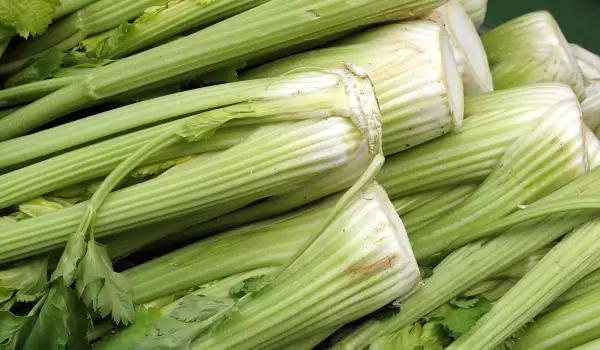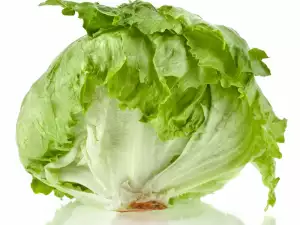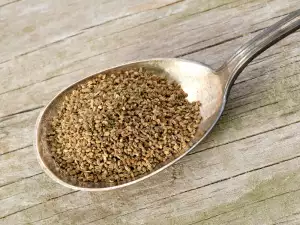Celery is a biennial vegetable that belongs to the umbellifer family, whose members are carrots, parsley and dill. Besides celery stalks, its leaves, roots and celery seeds are also used as a spice and food, as well as a natural medicine.
Celery grows 12 to 16 inches tall and is made up of leaves arranged along stems and arranged in a cone shape. Celery stalks have a crunchy texture and a delicate but slightly salty flavor. Celery can be found in different shades of green. In Europe a variety is also grown that is white in color.
Celery was cultivated from wild celery. Its origin traces back to the Mediterranean regions of North Africa and Southern Europe and also to areas east of the Himalayas.
Celery has a long history of use, initially as medicine and later as food. The ancient Greeks used celery leaves to make laurel wreaths for their famous athletes, while the ancient Romans used them as a spice. Only in the Middle Ages, the use of celery expanded beyond medicine and as a spice, but also as food. In Europe, it became popular towards the 18th century. Celery was introduced to the United States in the early 19th century.
Celery composition

Celery is an excellent source of vitamin C. It is a very good source of dietary fiber, potassium, folate, molybdenum, manganese and vitamin B6. Celery is also a good source of calcium, vitamin B1, vitamin B2, magnesium, vitamin A, phosphorus and iron. Celery contains about 35 milligrams of sodium in the stalks, so people who are sensitive to salt should consume it with caution.
1 cup of celery /120 g/ contains 19-20 calories, 0.90 g of protein and 0.17 g of fat.
Selecting and storing celery
When choosing celery, it is necessary to choose one that looks fresh and snaps easily. It should be relatively strong and compact when the stems are bent down. Leaves should be pale to light green in color and free of yellow or brown spots. Celery can sometimes have a black core, which is caused by insects. To check for damage, it is necessary to separate the celery stalks and look for brown or black spots. Celery that has seeds on the stalks is often more bitter in taste.
Celery is stored by placing in a sealed container or wrapped in a plastic bag or damp cloth and refrigerated. When storing peeled and chopped celery, it must be dry.
Culinary use of celery

Celery in cooking is used both as a root vegetable /stems and root/ and as a spice /its leaves/. Like all vegetables, celery can be boiled, fried and baked. To avoid a change in the color of celery stalks, you should subject them to minimal heat treatment. Note that the veins on the stems do not soften after cooking, so you must remove them carefully, starting from the narrow end of the stems.
On its own, celery can be eaten in various salads, cooked in broths and soups. Lovers of healthy eating drink freshly squeezed celery juice. As a spice, celery is used dried or fresh, finding application in the marinade of very tasty winter pickles.
Celery perfectly complements the taste of meat dishes and potato dishes. In the US, it is very common to dip a stalk of celery in blue cheese dressing combined with chicken wings, other appetizers or main dishes.
Celery seeds are very rich in essential oils, which is why they have a rather spicy smell. If you want to achieve a more intense taste of your dish, rub them with salt and add them.
The fresh celery root is nicely complemented by apples and carrots. You can prepare a healthy and vitamin rich puree from the mashed root. The grated root is a perfect addition to vegetable juices.
Benefits of celery
The health benefits of celery can be summarized in the following way:

- Celery is rich in vitamin C. Vitamin C helps protect the immune system and with cold symptoms. Vitamin C also protects the body from damage caused by free radicals. It also reduces the severity of inflammatory conditions, such as asthma, osteoarthritis and rheumatoid arthritis;
- Celery has potential benefits for reducing high blood pressure;
- Celery helps lower cholesterol levels in the blood;
- Celery has a diuretic effect. Celery, which is rich in potassium and sodium, the minerals most important for regulating fluid balance, stimulates the production of urine, thus helping the body to get rid of more fluids;
- Promoting optimal health. Celery contains compounds called coumarins, which help to prevent the damage that free radicals cause to cells, thus reducing the possibilities of cell mutations and the appearance of cancerous formations;
- Celery has excellent anti-inflammatory properties, as it is rich in antioxidants in its composition. It is a wonderful preventative against heart problems and Alzheimer's;
- Contains such important fibers in its composition, which support digestion. It is an effective remedy for constipation and slow metabolism;
- Contains vitamin K in its composition, which has a positive effect on the heart muscle;
- Celery is rich in phosphorus, which is why it is very useful for the health of bones and joints;
- It has a positive effect on the liver and the digestive system;
- It has a beneficial effect on the nervous system and also has a calming effect;
- In general, the useful properties of celery are due to its unique composition. For example, the root vegetable is a real health bomb, as it is rich in many vitamins and minerals that have a positive effect on nails, skin and hair;
- It helps to normalize the hormonal levels in the body and has a positive effect on the depressive state during the premenstrual syndrome;
- Celery leaves have an excellent anti-cancer effect. That is why they are particularly useful for smokers, as they destroy the carcinogens of tobacco smoke;
- Celery leaves are rich in carotene and vitamin E, which are very useful for eyesight, skin, hair and nails;
- Celery juice is also used as a vitamin supplement;
- The leaves of the root vegetable are also useful for prostatitis and are also used for potency problems. The reason for this is the hormone androsterone, which has a positive influence on male strength;
- Celery is a dietary product and 100 grams contain only 16 kcal. That is why you can safely add it to your menu if you have decided to lose extra weight;
- Increases the body's defenses, due to its excellent nutritional and vitamin composition. In addition to this, celery can even add a touch of passion to your relationship, as it improves a man's potency;
Medicinal properties of celery

1. Positively affects the immune system;
2. Excellent prophylactic agent for a number of diseases of infectious etiology;
3. It has a positive effect on the heart muscle and blood vessels;
4. It has a calming effect on the nervous system;
5. Excellent prophylactic action against atherosclerosis;
6. Recommended for gout;
7. It has a positive effect on kidney problems or the genitourinary system and also on hypertension (high blood pressure);
8. Helps the easier absorption of proteins, especially in combination with meat dishes;
9. Reduces the pain syndrome in gastritis, stomach ulcer and helps the liver;
10. Has a positive effect on the overall digestive system;
You would hardly find an alternative to celery, due to its rich composition - vitamins of group B, A, PP, C, K, iron, calcium, magnesium, phosphorus, folic acid, sodium, manganese. In addition to all this, the vegetable is low in calories and is also rich in essential oils, which are particularly important for the body.'
Contraindications for the use of celery

Celery root contains the substance apiol, which increases the strength of menstruation, therefore it should not be consumed during a heavy cycle. For the same reason, the plant is not recommended to be used during the third trimester of pregnancy, so that it doesn't provoke premature birth.
An interesting fact is that celery is one of the products that have a negative calorie content. This means that during digestion, the body uses more energy than it receives. That is why celery is a wonderful tool and helper in the fight against extra weight.
Celery should also not be used in case of:
1. Increased blood pressure;
2. Varicose veins and thrombophlebitis;
3. For adult patients who often have an exacerbation of a number of pathologies;
4. In case of kidney and gastrointestinal tract problems;
5. In case of enterocolitis and colitis;
6. In case of gallstone disease, cholecystitis, pancreatitis.
The purine in celery also negatively affects the deposition of uric acid in the body. That is why people who have arthritis are not recommended to add celery to their menu.
Can celery leaves be eaten?
Yes, you can safely use them both raw and dried. By adding them to the dishes, they will add a specific taste to the dish. Celery leaves visually resemble those of parsley, but are much more aromatic and spicy.
Weight loss with celery
Celery is a plant with which many dietary dishes and cocktails can be prepared during a weight loss diet. It is known for its diuretic and laxative properties and the low calorie content - only 33 per 100 g makes it the ideal dietary product. Specialists recommend that unloading or diet days with celery should not be more than 3.
When the vegetable is an additional ingredient of the diet regime, there are no time limits for observing the diet. Mix cocktails with celery, tomato juice and apples and in addition to a slim figure, you will provide your body with a real vitamin bomb.


















Comments